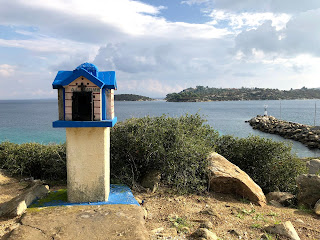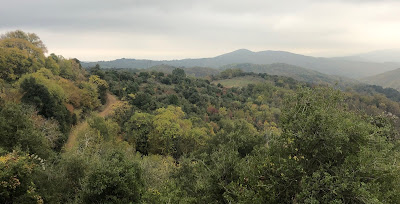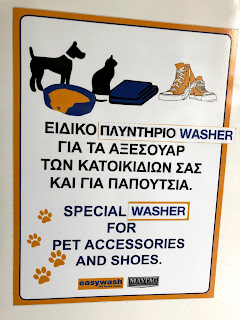The one figure who dominates this part of Greece is Alexander the Great. We had spent the night close to the ruins of ancient Pella where Alexander was born in 356 BC. It was a wet Sunday morning walk for the spaniels before we drove to the archaeological museum which houses the artefacts found when the old city was uncovered. The most stunning items were the grave goods. The Ancient Greeks believed the dead needed possessions to take with them to use in the underworld and these ranged from household items to perfume pots and weapons and, in the case of the really well off, armour covered in gold leaf. We may think Alexander the Great lived a very long time ago, 2,400 years to be precise, but the museum had pottery that dated from 7,000 BC. It was a sobering thought that Alexander was closer in time to us, than he was to the earliest items on display at his birthplace.
 |
| Some of ancient Pella survives |
 |
| Statues of Alexander are everywhere |
 |
| The Abduction of Helen of Troy |
 |
| The rain has boosted the falls a bit |
 |
| Impossible to avoid |
 |
| Behind the falls |
We were not disappointed. The authorities have built a museum inside the huge mound that houses the tombs of Philip and other notable figures of his time. He was murdered while attending a performance at a theatre, which you might have thought would have been a warning to Abraham Lincoln.
 |
| The entrance to the tomb of Philip II |
 |
| Names 2,000 years old were perfectly legible |
 |
| This gold box held the remains of Phillip II |
Tonight sees us on the edge of an almost empty car park on the outskirts of the village, which we are sharing with a French couple whose van is parked just below us. For a time the rain has ceased, the sun has been out and temperatures are back into the late teens and early twenties. Next week promises colder weather as we head further south to our eventual Christmas destination in the Peloponnese.
 |
| A painting from the tomb showing the abduction of Persephone by Hades |
 |
| This man was commemorated along with an image of his dog |













































